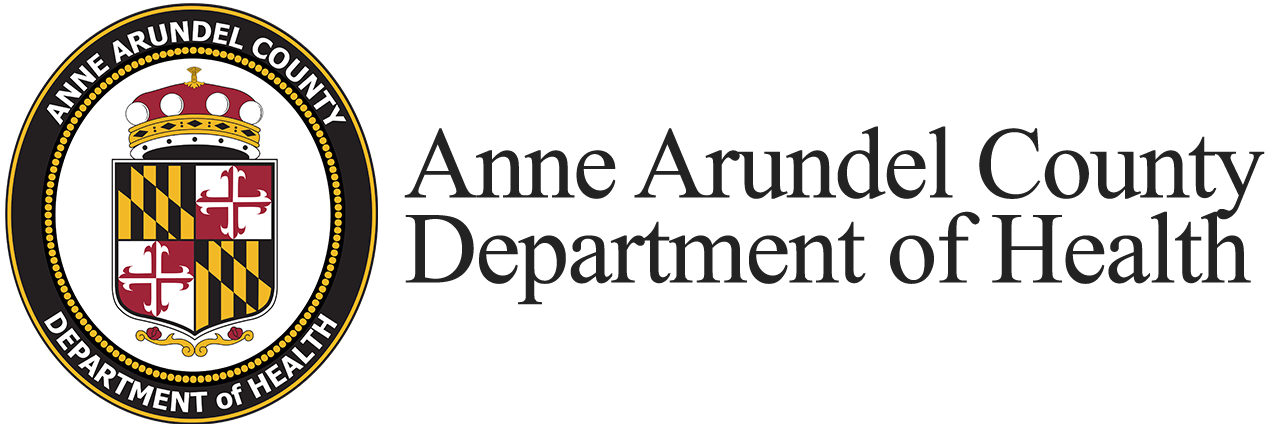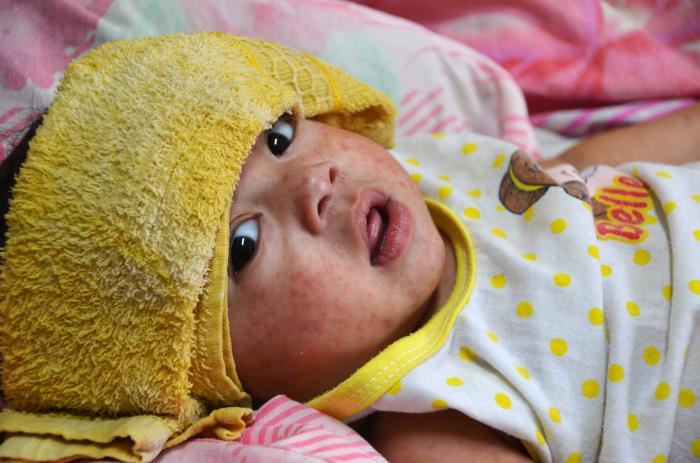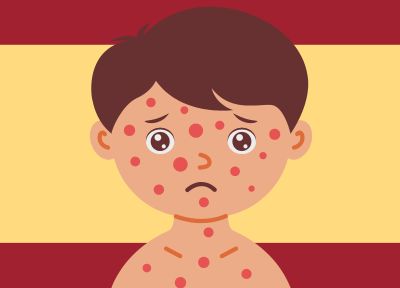Many international destinations are reporting increased numbers of cases of measles. The majority of measles cases imported into the United States occur in unvaccinated US residents who become infected during international travel. Know Before you Go.
Measles is a highly contagious virus. It can be prevented with a vaccine that protects against three diseases: measles, mumps and rubella. Measles can be dangerous, especially for babies and young children. Call your healthcare provider immediately if you think you or your child have been exposed to measles.
For questions about the vaccine, call our health centers at 410-222-6633 or 410-222-7247.
If you believe you or your child has symptoms or think there was an exposure, call your healthcare provider.
Healthcare providers can report cases of measles by calling 410-222-7254.
Measles Frequently Asked Questions
What are the signs and symptoms of measles? How is it spread?
Measles is an acute viral respiratory illness characterized by a high fever, cough, runny nose and/or conjunctivitis (red watery eyes).
A rash typically appears 3 to 5 days after initial symptoms, usually starting around the hairline and face and then spreading downward to the neck, trunk, arms, legs and feet. Symptoms usually appear about 7 to 14 days after a person is infected. Other symptoms may include small white spots in the mouth, swollen lymph glands and fatigue. Patients are contagious from 4 days before to 4 days after the rash appears.
It is important that people who have measles or might have measles stay home while they are contagious so that they don’t expose others.
What are the complications of measles?
Measles can be serious in all age groups. However, children younger than 5 years of age and adults older than 20 years of age are more likely to suffer from measles complications.
Common measles complications include ear infections and diarrhea.
Some people may suffer from severe complications, such as pneumonia (infection of the lungs) and encephalitis (swelling of the brain). They may need to be hospitalized and could die. Measles may cause pregnant women to give birth prematurely, or have a low birth weight baby.
Who should be vaccinated?
Measles can be prevented with the Measles, Mumps and Rubella (MMR) vaccine. The Centers for Disease Control and Prevention recommends that children get two doses of MMR vaccine. The first dose is routinely given at 12-15 months of age, and the second dose at 4-6 years of age. Teens and adults should also be up-to-date on the MMR vaccinations. The MMR vaccine is very safe and effective. Two doses of MMR vaccine are about 97% effective at preventing measles; one dose is about 93% effective.
Who should not get the MMR vaccine?
Some people should NOT get this vaccine and should talk to their medical provider before getting vaccinated. These include persons who:
- Have any severe, life-threatening allergies to a prior dose of MMR vaccine or have a severe allergy to any part of this vaccine
- Are pregnant, might be pregnant or are planning to become pregnant in the next month
- Have a weakened immune system due to disease or medical treatment
- Have immediate family members with a history of congenital or hereditary immunodeficiency
- Have a condition that makes them bruise or bleed easily
- Recently had a blood transfusion or received other blood products
- Have tuberculosis
- Have gotten some other vaccines in the past 4 weeks
- Have a moderate or severe illness
What are the recommendations if a person is unable to get vaccinated against measles?
Vaccination is the best way to prevent measles. If you are not already vaccinated and are unable to get the MMR vaccine because of a contraindication, you should be aware of where measles outbreaks are occurring. For up-to-date information, visit cdc.gov/measles/data-research/. If you are considering travel to any of these areas, discuss it with your healthcare provider.
Are titers to check immunity to measles recommended for people who have been vaccinated?
If you have documentation of receiving 2 doses of MMR vaccine, you generally do not need to have titers checked. If you have only 1 dose of MMR vaccine, you can get a second dose without checking titers first, as long as it has been 28 days since the first dose.
Is preventive treatment recommended for people exposed to measles?
If you think you have been exposed to measles, immediately call your health care provider and let them know that you have been exposed. Your doctor can determine if you are immune to measles based on your vaccination record, age or laboratory evidence, and make special arrangements to evaluate you, if needed, without putting other patients and medical office staff at risk.
If you are not immune to measles, an MMR vaccine or medicine called immune globulin may help reduce your risk of developing measles. Your doctor can help to advise and monitor you for signs and symptoms.
Is a third dose of MMR vaccine recommended for people exposed to measles?
A third dose of MMR to protect against measles is NOT recommended for anyone with documentation of two doses of MMR administered on or after the first birthday and given at least 28 days apart.
Are there any other recommendations regarding measles vaccination in special situations?
The following recommendations are for consideration for people who might be at increased risk of measles exposure, including people planning to travel to areas with measles outbreaks (see list of measles outbreaks reported at cdc.gov/measles/data-research/, or who might have contact with visitors from these areas.
- Children 6-11 months old: Give an initial MMR vaccine to children 6 months through 11 months of age to help protect them against measles. These children must be revaccinated when they are 12 through 15 months old and again when they are 4 through 6 years of age.
- Children 1-3 years old: Give a second dose of MMR vaccine to children 1 year through 3 years of age who have already received their first MMR vaccine, as long as 28 days have passed since the first MMR vaccine was given to them.
- Adults: In adults born after 1957 who have only received 1 dose of MMR vaccine, give a second dose of vaccine. MMR vaccine can also be given to adults born before 1957 if prior exposure to measles is uncertain.
How can pregnant women prevent measles?
The effectiveness of two doses of MMR vaccine is approximately 97%.
Pregnant women who have not received two doses of vaccine should not get the MMR vaccine during pregnancy. Pregnant women who need the vaccine should wait until after giving birth. Women should avoid getting pregnant for four weeks after getting the MMR vaccine.
If you are pregnant or planning to become pregnant and unsure of whether you have received two doses of MMR vaccine, talk to your health care provider.
If you are pregnant and exposed to measles, and haven't had two doses of MMR vaccine, call your health care provider right away because you might need a medication called immune globulin.
Should new parents and caregivers get vaccinated?
If parents or caregivers haven’t gotten the MMR vaccine or had measles in the past, they should get vaccinated. It’s important to make sure people who are around your new baby do not expose your baby to measles – and other diseases like whooping cough – that your baby is too young to be vaccinated against. This includes siblings, who should also be up-to-date on all their childhood vaccines for their protection and to protect the baby.
How do I get the MMR vaccine?
If you or your family member needs an MMR vaccine, first check with your healthcare provider. If your healthcare provider does not have the MMR vaccine available, you can reach out to your pharmacist to see if they carry it. In Maryland, a pharmacist may administer any vaccines included in the CDC's recommended Immunization Schedule to individuals ages 3 to 17 who have a prescription.
For those age 18 years or older, prescriptions are not required to administer vaccines as long as they are one of the adult vaccines listed by the CDC.
For information about pricing and insurance reimbursement, check with your pharmacist and insurance provider. If you do not have health insurance or your health insurance does not cover the MMR vaccine, check with your local health department.
How do I know if I have been exposed to measles in Maryland?
Possible public exposures to measles are listed on the MDH website at https://health.maryland.gov/measles.
What should I do if I have been notified that I might have been exposed to measles?
- If you are healthy and know you have had 2 doses of MMR vaccine, you do not need to take any additional actions.
- If your immune system is currently weakened by disease or medications, even if you have received two doses of MMR vaccine, call your health care provider right away and tell them you might have been exposed. Even if you have received 2 doses of MMR vaccine, you might need an additional medication called immune globulin.
- If you know you have NOT received 2 doses of MMR vaccine, or if you aren’t sure whether or not you have received 2 doses of MMR vaccine, call your health care provider right away to determine what to do next. You might need a dose of MMR vaccine or a medication called immune globulin. Pregnant women can’t receive MMR vaccine but might need immune globulin.
- Monitor for possible symptoms such as fever, cough, runny nose, red eyes and rash for 21 days after your last possible exposure. Stay home and check in with your health care provider if you develop any of these symptoms. Call ahead to tell the medical office that you might have measles so they can make special arrangements to evaluate you, if needed, without putting other patients and medical office staff at risk.
Do I have to stay home if I have been exposed to measles?
Most people will not have to stay home as long as they are feeling well and do not have any symptoms. However, it is important to monitor for possible symptoms of measles, such as fever, cough, runny nose, red eyes and rash. Stay home and check in with your health care provider if you develop any of these symptoms. Call ahead to tell the medical office that you might have measles so they can make special arrangements to evaluate you, if needed, without putting other patients and medical office staff at risk.
Those who fall into certain categories such as schools, daycares and medical personnel, may be required to stay home if they are not up-to-date on their MMR vaccine.
My family member was diagnosed with measles. Do I have to stay home?
It is not required that family members or other contacts of measles cases restrict their movement if they are not ill.
Where can I find up-to-date information about measles in Maryland?
Measles case counts are posted on the Maryland Department of Health website at health.maryland.gov/measles. Also check with your local health department for additional resources on measles.


 Protect Your Child From Measles
Protect Your Child From Measles